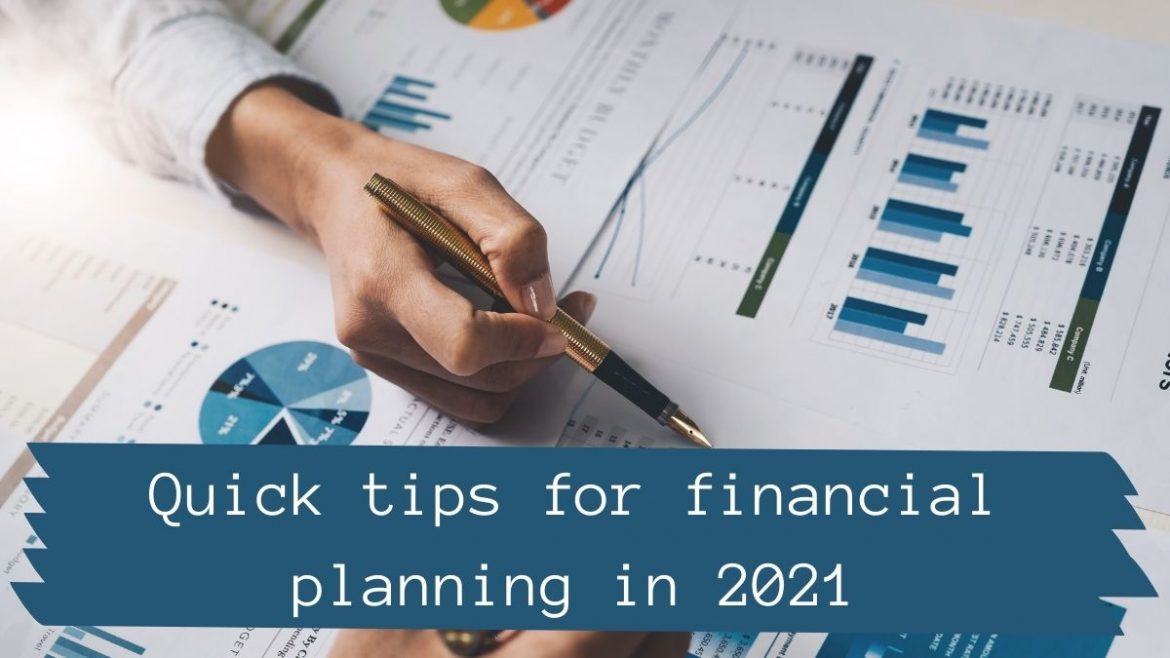

Financial planning in 2021 – The year 2020 was one of such nightmares which many of us would definitely like to forget at all costs. Nevertheless, this year also taught us a lot about many aspects of life which we almost pay no attention to. In all, with the announcement of the vaccination drive for COVID-19, the year 2021 has rung a bell and has shown us a ray of hope in the gloomy times.
But has everyone learned the lesson for good from the year 2020 and has started acting upon it. New year resolutions have not gone stale yet and we would like to remind you as to how you can make the year 2021 the best year.
As we have steered ahead in Unlock 2.0, now slowly the finances, economy, employment markets, stock markets are beaming up. But until and unless you understand how to carry out financial planning for this new year 2021, you won’t be able to achieve much this year too.
So, let’s learn some quick tips for financial planning for 2021:
Make financial resolutions for 2021 and stick to it
New year resolutions are really fun and motivating, but how to ensure that we stick to those? Try to mix consistency in your daily routine and reap the benefits of a loyal disciple of your own resolutions.
You could build a budget which may be designed to help you achieve some goals which may be
- Tax saving
- Retirement planning
- Vacation planning
- Emergency fund arrangements
- Wealth building for the long-term
- Cutting back on unnecessary spending and shopping etc.
The list is exhaustive but it is always recommended that you should build a financial budget to ensure that at least 3 of your financial goals are achieved. Sticking to the budget is very easy and there are also some tools and apps available for your convenience.
Tax Planning
Most people usually interpret tax planning as last-minute investments into anything which will suffice the deduction limit. However, there is much more to tax planning. Not all tax-saving instruments are made up to suit everyone’s risk appetite and investment goals. Let’s take the example of Mr. A who needs to invest in tax-saving instruments. Mr. A also wants to make most of it even where he is ready to accept moderate risk. Mr. A should invest in ELSS – Mutual Funds (blue chip or large-cap typically), which would allow him to claim deduction under section 80C. One more advantage is that Mr. A will be able to earn around 12-13% with moderate market risk.
Investment Goals
If there is no goal, then there could be no financial planning. Ideally, financial planning would be divided into 3 types of goals
Short Term Goals
Tax planning or contingency fund planning is usually the short-term financial goal. Short Term goals cover the time period of 1-3 years. The investments with a lock-in of 3 years period or investments with maturity for such a short period would be suited to meet certain annual cash flow or expenditure. A most suitable example of such expenditure would be insurance payments or school fees payment etc.
Medium Term goals
A most appropriate example of a medium-term goal would be buying a house or school fees till graduation. Vacation planning can also be carried out in the medium term.
Related Article: 5 Reasons Of Having Your Own Financial Advisor From An Early Age – (fintoo.in)
Long Term Goals
Retirement planning would be peculiar examples of Long term financial planning. Investments having longer payment periods or with maturity/redemption expected at a much later date than 10 years would mostly be suitable. Equity investments would be also suitable for long-term financial planning.
Medical Insurance

With COVID 19 in the background of the year 2020, the upcoming year 2021 would also be witnessing some ups and downs in the health security area. Following points to ensure that you are on the safe line.
- Revisiting the medical insurance coverage
- Check whether the current insurance cover is sufficient to cover hospital admission, room rent, etc.
- Check whether the medical insurance covers the major and terminal diseases
- Understand that it is better to pay the premium now and reduce the bigger cashflow at the time of the actual incident.
Take care of your health
The year 2020 was a lightening effect to make us understand the benefits of good health. If you have good immunity, then you can definitely save yourself from multiple diseases and in turn much of your money too.
Subscribe to the Yoga class, take admission to Gym, take out time for a healthy jog. Break the routine of Work from Home and try to get out for fresh air. This will reduce mental stress and as well as add to the health benefits.
Revisit the retirement plan
With COVID 19, many of us saw the actual job loss and pay cuts. This shows how critical it is to ensure that we revisit our retirement planning. While you assess the retirement plan, here are few things to check on
- Inflation factor
- Increased expected medical expenditure
- Reduced pay or no income in some cases
- Liquidity crunch etc.
Create an Emergency fund
It is a known fact that a fund equal to six months of your income should be maintained as a liquid investment so that it could be used in the event of no active income source. Ideally, an emergency fund can be created by investing in short-term fixed deposits or recurring deposits, or mutual funds.
Related Article : Personal Financial Planning – Why Is It mandatory For All ? – Fintoo Blog
Learn something
Learn something new which will help you either in getting –
- An increment in the current job or
- A new job or
- Promotion etc.
This new skill may also help you add an additional income stream which you could use as an emergency fund.
Strengthen your credit score
Try to pay off loans with the highest interest rate first. Also, avoid buying things on credit cards. Once you default on loan repayments, it hampers your credit score badly. So always make sure that you are not defaulting on repayments.
Say no to unnecessary investments and tips
Most of the investors usually go out and make investments based on insider tips or commission agents’ advice. Try to take the help of a professional if you can not do it yourself.
These 10 Tips will help you out in building a sustainable financial plan for the year 2021. These pillars will help strengthen financial health in the coming years. Having said so, just building a plan is not enough. You will need to ensure that you stick to the Financial Resolutions to make it work for you.
To Invest and keep regular track of your portfolio download: Fintoo App Android http://bit.ly/2TPeIgX / Fintoo App iOS http://apple.co/2Nt75LP
Related Posts
Stay up-to-date with the latest information.


